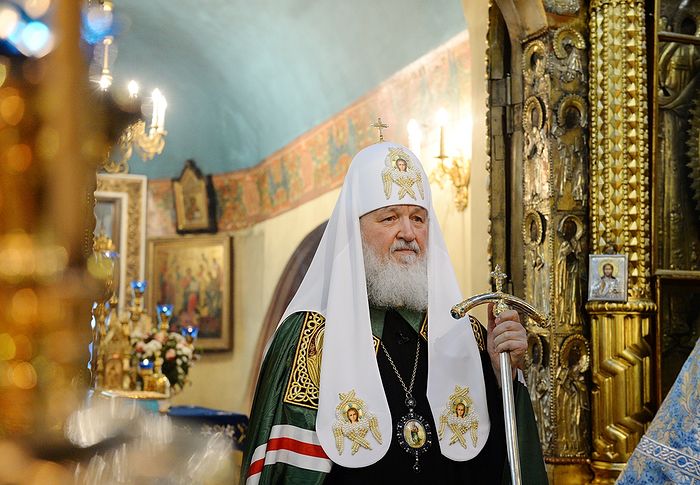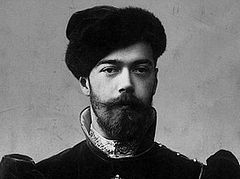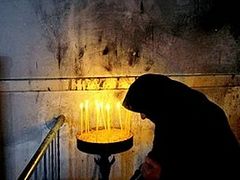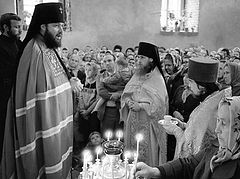You can never achieve good results through injustice
Without dwelling on the details of this tragic event, we will say only that no efforts to build a happy, righteous, prosperous life can bear fruit if they are connected with crime and suffering. Probably those who forced the emperor to abdicate thought: The tsar will leave the Russian throne, fully discredited by hostile forces, having lost credibility in society, and others are coming—smart, intelligent, educated, of the European Enlightenment, giving brilliant speeches then in parliament, in the State Duma. And these speakers, boiling over with righteous anger against the emperor, believed that as soon as authority rested in their hands, new times would come and Russia would live a happy life.
We know that the abdication of the tsar and the coming into power of other forces failed to lead to anything even similar to that. Those who took power from the tsar gave it to even more radical forces, and we know the outcome of this tragedy. It did not end immediately—not even after the bloody and terrible civil war, not even after a time of dictatorship and the mass repressions associated with it, not even after the bloody war that claimed millions and millions of lives, not even in the post-war times and not even in the nineties when we again pondered how to change the life of the country. How much hope there was that it would happen! But then the state collapsed, and a great country split apart… You would have to be blind to not see the cause and effect relationship and come to the simple conclusion that we will never reach any good results through unrighteousness, deception, evil, and death.
To draw the right conclusions from the hardest lessons of the last century
Today we will summarize this severest of centuries. For all our people’s achievements in science, art, and other fields, this national tragedy will never leave our memory. But to preserve it in our memory is not enough—we must draw some conclusions. Everything that happened to us a hundred years ago and continued throughout the better part of a century shows us the greatest example of the power of Divine Providence. God is able of these stones to raise up children unto Abraham (Mt. 3:9). He can miraculously change people’s lives, and the whole country. But it’s very important that changes in our personal lives and the life of society are never accompanied by lies and evil that close the gates to Divine grace. If we try to build a happy life by our cruelty, evil, and lies, then God retreats and leaves us to our own devices.
By the grace of God, we can sincerely and without any political commentary turn this page of our fatherland’s history on the centenary of our turmoil. We turn it, remembering the martyrs, confessors, and innocent victims, but also the heroes of labor and military glory. We prayerfully remember the history of this century and we ask the Lord that through the prayers of His Most Pure Mother, whose Reigning icon was revealed a hundred years ago, our country and every one of us would move forward in accordance with God’s moral law, and that crimes, innocent victims, lies, slanders, deception, and gullibility towards evil and false words would never again become a driving force changing the lives of our people. We will ask the Heavenly Queen that she show her mercy to us all, but especially to the younger generation. May God grant that no circumstances hinder them, and all of us, from drawing the correct conclusions from the hardest lessons of the previous century.
From the homily after the Liturgy
in the Church of the Kazan Icon of the Mother of God
in Kolomenskoye Park, Moscow, March 15, 2017,
on Wednesday of the third week of Great Lent,
the day of the 100th anniversary of the discovery
of the “Reigning” Icon of the Mother of God
Holiness is not a synonym for weakness
What did St. Daniel of Moscow do, that we glorify him as a venerable and right-believing prince? He did many things: he realized the Christian spiritual ideal in such a place and such conditions in which it was nearly impossible to realize such an ideal. Indeed, in his time, in the Russian expanses, occupied by the Horde, civil strife was constantly breaking out. Russian princes, aware that they had no power to free themselves from the Tatar-Mongol invasion, began to conquer living spaces and enrich their coffers at one another’s expenses. And blood brothers—they were nearly all related—entered into the pitch blackness of bloody internecine strife. That prince who took more land from his neighbor, who had a richer treasury, who had a stronger army, became more important. But these princes were usually subservient to their higher authorities—to the Khan—and, often relying on the Khan’s force, fought with their brothers, greatly increasing their local power and wealth.
St. Daniel refused such a lifestyle and such actions. He never attacked anyone first, and even when he was attacked, he did everything possible to reconcile. From the point of view of medieval customs, he took unthinkable steps of self-humiliation. But it was these steps that led to him, as a prince, becoming a saint.
But holiness is not a synonym for weakness, and holy Right-Believing Prince Daniel’s father, the holy and great Right-Believing Prince Alexander Nevsky is a beautiful example of this. He was also an affectionate, kind, and gentle man, but when it was necessary he took up his sword and protected his people. The same thing happened in the life of the holy prince Daniel. When the prince of Ryazan, desiring to expand his possessions at the expense of Moscow, decided to seize the Moscow princedom, holy Right-Believing Prince Daniel drew his sword and defended Moscow, soundly defeating the invader. And then what? Usually the winner would ride into the capital of the invader, capture the people, empty the treasury, and annex the land. Holy Prince Daniel never did this, and the Ryazan Princedom, having lost its opportunity to attack Moscow, peacefully continued its existence.
The life of St. Daniel shows us an amazing example of how holiness can be realized at any level of human life, in any position, under any government or anarchy. Any man can become a saint—rulers, generals, simple soldiers, and secular people, whether scientists, government representatives, school teachers, hospital nurses, or cemetery caretakers—anyone can become a saint. And no external circumstances can prevent him if he does not prevent himself. Holiness is the realization of God’s law in our lives. It’s not a failure to overcome unrighteousness, human evil, and aggression; it is not a synonym for weakness. It is an expression of great inner spiritual strength, which helps to achieve success in earthly life, because before a saint not only do people’s hearts open, but also many doors—that to evil people are closed.
From the homily after the Liturgy
in Danilov Monastery, Moscow
March 17, 2017, on Friday of the third week of Great Lent,
the day of the holy Right-Believing Prince Daniel of Moscow




